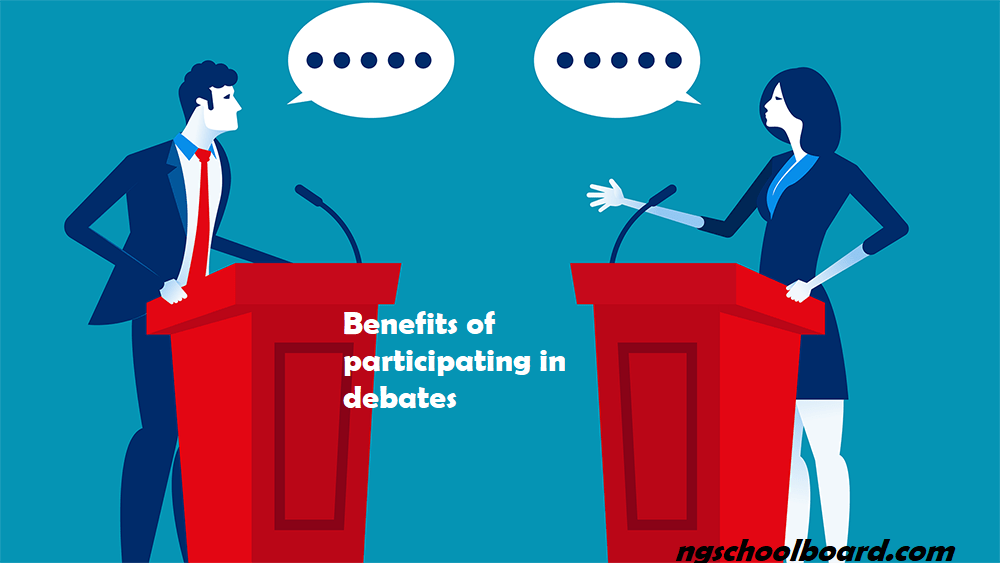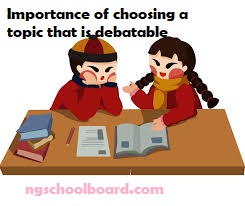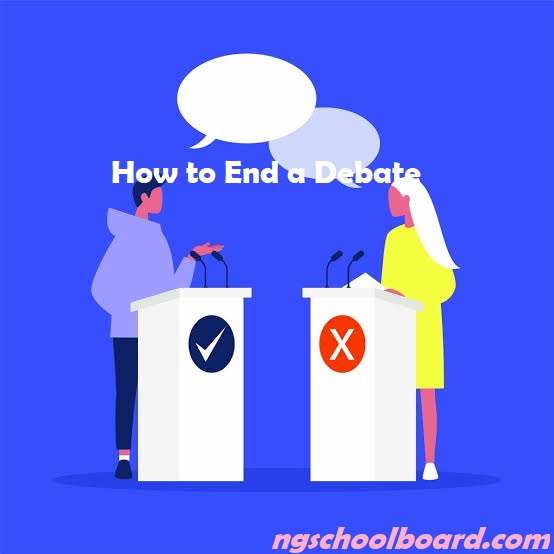Debates are an excellent way for secondary school students in Nigeria to develop critical thinking and public speaking skills.
Participating in debates can help students learn how to express their opinions effectively and respectfully while also learning how to listen to and consider other perspectives.
Additionally, debates can be an opportunity for students to engage with current events and complex issues in a structured and constructive way. See How to End a Debate.
In this blog post, we’ll explore some potential debate topics that are relevant and engaging for secondary school students in Nigeria, as well as provide some tips for structuring and participating in debates effectively.
Before I proceed to this topic, always remember that if you are looking for a secondary school near you for your kids, ngschoolboard is the best school search website in Nigeria today.

What and why Debates are important for secondary school students in Nigeria.
Debates are formal discussions where participants argue opposing viewpoints on a specific topic or issue. In a debate, each participant presents their arguments and responds to their opponent’s arguments in a structured and respectful manner.
Debates can be important for secondary school students in Nigeria because they offer a platform for developing critical thinking skills and enhancing public speaking abilities.
Participating in debates can help students learn how to express their opinions in a clear and effective way while also considering and respecting the opinions of others.
Debates also provide a forum for students to engage with important issues in Nigerian society, promoting civic engagement and encouraging critical analysis of current events.
See How To Conduct Debate Competition
Benefits of Participating in Debates

Participating in debates can offer a range of benefits for secondary school students in Nigeria, including:
- Developing critical thinking skills: Debates require participants to research and analyze arguments from multiple perspectives. This helps students develop critical thinking skills and the ability to evaluate evidence and formulate logical arguments.
- Improving public speaking: Debates provide a structured setting for students to practice public speaking skills, such as delivering clear and concise arguments and responding to opposing viewpoints.
- Enhancing research skills: Participating in debates often requires thorough research and preparation, which can help students develop research skills and learn how to find reliable sources of information.
- Promoting teamwork: Debates often involve working as a team to develop arguments and respond to opposing viewpoints, which can help students develop teamwork and collaboration skills.
- Encouraging civic engagement: Debates provide a forum for discussing important issues in Nigerian society, which can encourage students to become more engaged in civic life and help them develop a deeper understanding of social and political issues.
How to choose a debate topic

Choosing a debate topic can be challenging, but here are some tips to help you select a good one:
- Choose a topic that is relevant: Debates are more engaging when they are centered around topics that are relevant to the student’s lives. Select a topic that is currently in the news or is of concern to students in Nigeria.
- Choose a topic that is debatable: A good debate topic should have arguments on both sides. This means that there should be valid points for both the affirmative and negative sides of the debate.
- Choose a topic that sparks interest: Choose a topic that will spark the interest of the students. This can be a topic that the students have a personal connection to or one that they are curious about.
- Choose a topic that is age-appropriate: Ensure that the topic is appropriate for the age and maturity level of the students. Avoid topics that are too complex or sensitive.
- Choose a topic that is specific: A good debate topic should be specific enough to allow for a focused discussion. It should not be too broad that it becomes difficult to argue for one specific point of view.
By considering these tips, you can choose a debate topic that is engaging, informative, and relevant to the student’s lives.
Tips on How to Select a Good Debate Topic

Here are some tips on how to select a good debate topic:
- Choose a topic that is relevant to current events: Select a topic that is currently making headlines in Nigeria or internationally. This could include topics such as climate change, immigration policies, or social media regulation.
- Choose a topic that sparks student interest: Look for topics that are likely to spark students’ curiosity and enthusiasm. This could include topics such as music censorship, standardized testing, or the use of social media in politics.
- Choose a topic that is important for the community: Consider topics that are relevant to the local community, such as school safety, drug abuse, or urban development.
- Choose a topic that is controversial: Debates are more interesting when there are strong arguments on both sides. Consider choosing a topic that is controversial, such as gun control or capital punishment.
- Choose a topic that is age-appropriate: Ensure that the topic is appropriate for the age and maturity level of the students. Avoid topics that are too complex or sensitive.
By selecting a good debate topic, students will be more engaged in the debate and will have an opportunity to learn and explore different perspectives on important issues.
Importance of choosing a topic that is debatable

Choosing a topic that is debatable is important because it allows for a more engaging and informative debate.
When there are valid arguments on both sides, it forces participants to research and analyze different perspectives, which can help them develop critical thinking skills and a deeper understanding of the issue at hand.
Both sides are expected to present logical arguments and supporting evidence to support their claims in a debate.
If a topic does not have valid arguments on both sides, the debate can become one-sided, and it may be difficult for students to engage in constructive dialogue.
In such a scenario, students may not be able to develop a full understanding of the issue or the opposing viewpoints.
By choosing a debatable topic, participants can learn how to formulate and articulate arguments effectively while also learning how to listen to and consider the perspectives of others respectfully.
Additionally, a debate on a debatable topic is more likely to generate interest and engagement among the audience, encouraging critical thinking and civic engagement.
List Of Debate Topics for Secondary Schools in Nigeria

Here are some debate topics that are appropriate for secondary school students in Nigeria:
- Should students be required to wear uniforms to school?
- Should the government provide free education for all students?
- Should social media be regulated by the government?
- Should the voting age be lowered to 16?
- Should the death penalty be abolished in Nigeria?
- Should animal testing be banned?
- Should Nigeria transition to a cashless society?
- Should parents be held responsible for their children’s actions?
- Should genetically modified foods be labeled?
- Should Nigeria allow same-sex marriage?
- Should cell phones be banned in schools?
- Should the government provide free healthcare for all citizens?
- Should the drinking age be lowered or raised?
- Should Nigeria invest in renewable energy sources?
- Should athletes be allowed to kneel during the national anthem?
- Should Nigeria adopt a universal basic income?
- Should schools teach students about mental health and wellness?
- Should the government regulate internet access?
- Should Nigeria legalize marijuana for medical or recreational use?
- Should public universities be tuition-free in Nigeria?
- Should schools implement sex education?
- Should single-sex education be mandatory in Nigeria?
- Should there be a limit on the number of children that a family can have?
- Should Nigeria adopt a system of affirmative action to promote diversity and inclusion?
- Should all citizens be required to perform military service?
- Should the government provide subsidies to small businesses?
- Should the government regulate the prices of essential commodities?
- Should Nigeria invest in space exploration?
- Should parents be allowed to homeschool their children?
- Should Nigeria adopt a two-party system for elections?
- Should the use of plastic bags be banned in Nigeria?
- Should the government increase the minimum wage?
- Should Nigeria adopt a presidential or parliamentary system of government?
- Should foreign aid be accepted by Nigeria?
- Should school hours be extended or shortened?
- Should Nigeria invest in building more prisons?
- Should the government provide free meals for all students in public schools?
- Should Nigeria adopt a policy of strict immigration control?
- Should religious studies be a mandatory subject in schools?
- Should Nigeria implement a system of mandatory voting?
- See more debate topics here.
Remember, when selecting debate topics, it’s important to choose ones that are relevant, age-appropriate, and debatable so that students can have a productive and informative discussion.
Click to search for the best creche near me now
A brief explanation of each topic and some possible arguments that could be made for each side.
Here are brief explanations of some of the debate topics mentioned earlier, along with possible arguments for each side:
- Should students be required to wear uniforms to school?
Arguments for uniforms: School uniforms can promote a sense of unity and discipline among students, reduce peer pressure and bullying, and make it easier to identify students in the school environment.
Arguments against uniforms: School uniforms can be expensive and may create a financial burden on families, limit individual expression and creativity, and may not necessarily improve academic performance or discipline.
- Should the government provide free education for all students?
Arguments for free education: Free education can reduce inequality and ensure that all students have access to quality education, promote social mobility, and benefit the economy in the long term.
Arguments against free education: Free education may not necessarily improve the quality of education or reduce dropout rates, may create a financial burden on the government, and may not necessarily address the root causes of educational inequality.
- Should the drinking age be lowered or raised?
Arguments for lowering the drinking age: Lowering the drinking age can reduce binge drinking and alcohol-related accidents among young adults, promote responsible drinking, and recognize the maturity and judgment of 18-year-olds.
Arguments against lowering the drinking age: Lowering the drinking age can increase alcohol-related accidents and health problems, but younger teenagers are at risk, and this sends a message that drinking is acceptable and encouraged among young adults.
- Should Nigeria invest in renewable energy sources?
Arguments for investing in renewable energy: Investing in renewable energy can reduce Nigeria’s reliance on fossil fuels, reduce carbon emissions and air pollution, create jobs and promote economic growth, and improve energy security.
Arguments against investing in renewable energy: Investing in renewable energy can be expensive and may not necessarily provide immediate benefits, may require significant infrastructure development and maintenance, and may not necessarily address the root causes of Nigeria’s energy problems.
- Should athletes be allowed to kneel during the national anthem?
Arguments for kneeling during the anthem: Kneeling during the national anthem can promote peaceful protest against racial discrimination and inequality, highlight issues of social injustice, and exercise freedom of speech and expression.
Arguments against kneeling during the anthem: Kneeling during the national anthem can be disrespectful to the country and the flag, may be seen as unpatriotic, and may not necessarily address the root causes of social injustice.
Remember, these are just some possible arguments for each side of the debate, and there may be many other valid points to consider.
It’s important to encourage students to conduct research, gather evidence, and formulate their own arguments based on the available information.
Click to search for the best primary school near me now
Structuring a Debate
A debate typically follows a structured format with each side presenting their arguments and responding to the opposing team’s arguments. Here is a basic structure of a debate:
- Opening statements: Each team presents an opening statement to introduce their position on the topic. These statements typically provide an overview of the main arguments and evidence that will be presented during the debate.
- Rebuttals: Each team then has an opportunity to rebut the opposing team’s opening statement, presenting counterarguments and evidence to refute their opponent’s position. This is a critical part of the debate, as it allows each team to directly address the other team’s arguments.
- Cross-examination: After the rebuttals, each team has an opportunity to ask the opposing team questions about their arguments and evidence. This allows each team to clarify their opponent’s position and challenge their arguments.
- Main arguments: Following the cross-examination, each team presents its main arguments and evidence to support its position. Each team may take turns presenting their arguments, or they may present them simultaneously.
- Rebuttals and refutations: Once the main arguments have been presented, each team has another opportunity to rebut the opposing team’s arguments and present further evidence to support their own position. This stage is critical for each team to reinforce their arguments and address any weaknesses in their opponent’s arguments.
- Closing arguments: In the final stage of the debate, each team presents a closing argument summarizing their position and the main arguments and evidence presented during the debate. This is an opportunity for each team to make a final persuasive appeal to the judges or audience.
Debates often have a time limit for each stage, and speakers are typically given a set amount of time to present their arguments and rebuttals.
A successful debater must be able to think quickly and respond to their opponent’s arguments effectively, while also presenting clear and persuasive arguments of their own.
Click to search for the best Nursery school near me now
Tips on how to effectively structure a Debate
Winning a debate is so dependent on the way and manner in which you structure your debate points, so therefore Here are some tips on how to effectively structure a debate:
- Use evidence to support arguments: Use facts, statistics, expert opinions, and other evidence to support your arguments. This will make your arguments more persuasive and help you to counter your opponent’s arguments.
- Avoid personal attacks: Personal attacks can undermine your credibility and distract from the actual debate topic. Stick to discussing the issues and avoid attacking your opponent personally.
- Use clear and concise language: Use language that is clear and easy to understand. Avoid jargon or technical terms that your audience may not be familiar with.
- Use logical reasoning: Use logical reasoning to support your arguments. This means presenting arguments that are logically connected and that make sense based on the evidence.
- Be respectful: Be respectful to your opponent and the audience. Listen carefully to what they are saying and respond thoughtfully and respectfully.
- Stay focused on the topic: Stick to the topic at hand and avoid getting sidetracked by other issues. This will help you to present a clear and focused argument.
- Practice your delivery: Practice your delivery and timing to ensure that you can effectively present your arguments within the time limit. This will also help you to feel more confident and comfortable during the debate.
- Be open to feedback: Be open to feedback and constructive criticism from your opponent and the audience. This will help you to improve your debating skills for future debates.
Overall, effective debating requires a combination of preparation, critical thinking, and effective communication skills. By following these tips, you can effectively structure your debate and present a persuasive argument.
Click to Search for the best secondary school near me now
See Maryland Comprehensive Secondary School Overview
Conclusion
Recap on the importance of debates for secondary school students in Nigeria.
Debates are an important activity for secondary school students in Nigeria for several reasons:
- Develops critical thinking skills: Debating requires students to think critically, analyze information, and evaluate arguments. This helps them to develop important critical thinking skills that will be useful in other areas of their academic and personal lives.
- Improves public speaking: Debating requires students to present their arguments and ideas in front of an audience. This helps to improve their public speaking skills, which is an important skill for success in many fields.
- Builds confidence: By participating in debates, students can build their confidence and develop their self-esteem. This can have a positive impact on their academic performance and personal growth.
- Encourages teamwork: Debating is often done in teams, which helps to foster teamwork and collaboration skills. Students learn to work together to develop and present their arguments effectively.
- Increases knowledge: Debating topics often require research, which helps to increase students’ knowledge and understanding of important issues. This can help them to become more informed citizens and make more informed decisions in their personal and professional lives.
Overall, debates are a valuable activity for secondary school students in Nigeria. They help to develop important skills, build confidence, and increase knowledge and understanding of important issues.
See WAEC Timetable
Summary
If you are a secondary school student in Nigeria, participating in debates can be a rewarding and enriching experience. Here are some ways to get involved:
- Join a debate club: Many schools have debate clubs that are open to students. Joining a debate club is a great way to get started and meet other students who are interested in debating.
- Participate in inter-school debates: Many schools organize inter-school debate competitions, which are a great way to showcase your skills and compete with other schools.
- Start a debate team at your school: If your school does not have a debate team, consider starting one with other interested students. This can be a great way to develop your skills and compete against other schools.
- Participate in online debates: With the rise of online platforms, there are now many opportunities to participate in online debates. Look for online debate clubs or forums where you can engage in debates with other students from around the world.
- Attend debate workshops and conferences: Look for debate workshops and conferences in your area, which can provide valuable training and networking opportunities.
Whatever method you choose, participating in debates can be a great way to develop your skills, build your confidence, and increase your knowledge and understanding of important issues.
Don’t be afraid to take the first step and get involved in this exciting and rewarding activity!
Also see:
75 Funny Debate Topics To Make Students Laugh
How to Write Application Letter for Teaching Job as an Undergrad







How To End A Debate: Top 7 Best Expert Examples - NGschoolBoard
[…] See Top Best 50 Debate Topics for Secondary Schools in Nigeria […]
How To Conduct Debate Competition 2023- Tips & Guidelines - NGschoolBoard
[…] See Debate Topics for Secondary Schools […]